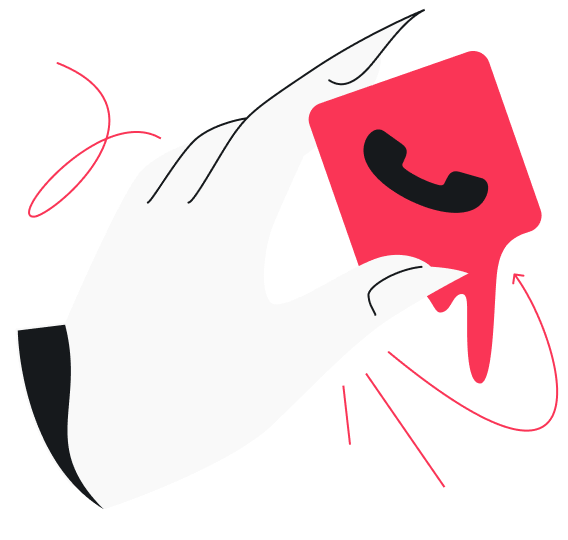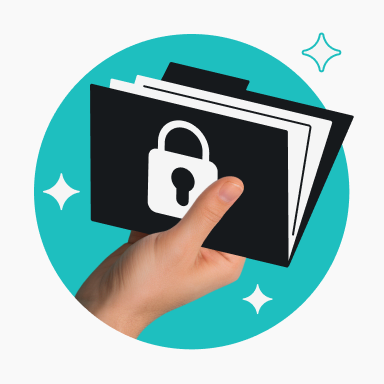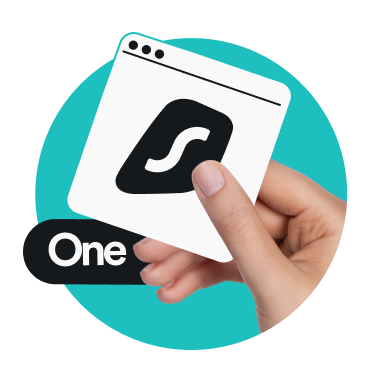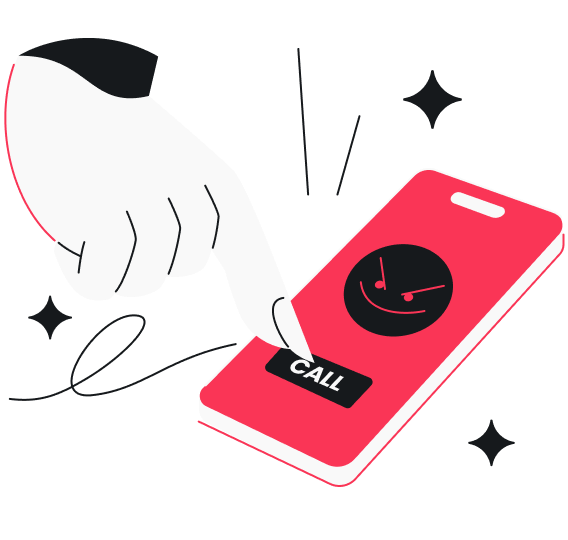Finding out that your number leaked onto the dark web sounds scary, but it doesn’t mean you’re doomed.
Let’s break down exactly what it means and what you can do about it.
What it means when your phone number is on the dark web
When your phone number appears on the dark web, it usually means your personal data was part of a data breach.
The dark web is the hidden part of the internet that traditional search engines like Google can’t access. Unlike the surface web we use for daily browsing, the dark web can only be reached with specialized software like the Tor Browser. A part of the broader deep web that’s generally more legitimate, the dark web often houses stolen data that cybercriminals buy and sell.
How do phone numbers get on the dark web?
There are several common ways leaked phone numbers can end up on the dark web:
- Data breaches: major companies, from retailers to social media platforms, experience security incidents where hackers gain access to customer databases. When this happens, your phone number, along with other sensitive information like passwords and email addresses, can be stolen and sold on dark web marketplaces;
- Social engineering attacks: scammers can trick people into revealing their phone numbers. They can contact you pretending to be from a bank or government agency and ask you to verify your number for security purposes. Once scammers have it, your cell phone number can end up on dark web databases;
- Shady apps and websites: certain mobile apps or webpages collect more data than they should. Questionable free apps you download or sketchy websites you sign up for might harvest your phone number and sell it to dark web data brokers.
How to find out if your phone number is on the dark web
You don’t have to guess if your phone number was leaked. Several dark web monitoring services can scan for your personal information, including your mobile phone number.
Dark web monitoring works by using specialized tools to search hidden sites, forums, and marketplaces for data linked to you, including things like:
- Compromised login credentials (usernames, passwords, etc.);
- Personal email addresses;
- Financial details (bank accounts and credit card numbers);
- Government-issued IDs;
- Medical or insurance records;
- Communication logs (emails or private messages).
If your data is found on the dark web, you’ll get an alert to take corrective action, like changing your passwords or freezing your credit cards, before serious harm is done.
But remember that a dark web scan can’t remove your data from the dark web. It helps you react quickly and should be part of a larger personal cybersecurity strategy.
Pro tip: The Federal Trade Commission also recommends checking your credit reports regularly, as signs of identity theft often appear there first. Your credit monitoring services may include dark web scanning as part of their features as well.
Wondering how to begin protecting your private information? Surfshark Alert monitors your emails, credit cards, and IDs, alerting you whenever it detects a personal data leak. Discover if your sensitive data has leaked and find out which steps to take next with Alert in the Surfshark One bundle.
Can someone do damage with just your phone number?
Finding your phone number on the dark web isn’t a sure sign you’ll be harmed, but it increases your risk of running into these problems:
- Spam and scam calls: you’re more exposed to scams and may receive unwanted calls or texts more frequently. Criminals can use leaked phone numbers to target victims with robocalls, phishing attempts, and more;
- Identity theft: after getting your phone number and other personal details from the dark web, it’s easier for criminals to impersonate you or open new accounts in your name;
- SIM swap fraud: criminals may contact your mobile service provider and convince them to transfer your phone number to a new SIM card they control. This lets them see your calls and texts and can help them reset your passwords, gain access to your bank accounts, or receive verification codes meant for you;
- Account takeovers: scammers can use your phone number to reset passwords on your online accounts, especially if you use SMS-based MFA (Multi-factor Authentication);
- Phishing and smishing attacks: scammers can call or text you pretending to be from your bank, credit card company, or another trusted organization. These messages might ask you to select links or provide private information like your bank account or Social Security number.
The real-world consequences of any of the above are serious. FBI data shows SIM swapping victims lost over $48 million in 2023, with attackers walking away with $38,000 in a single case.
When it comes to identity theft, the Federal Trade Commission received fraud reports from 2.6 million consumers who say they lost $12.5 billion in 2024.
While a stolen phone number alone might not immediately compromise your identity, it’s often the key that opens the door to much bigger problems.
What to do if your phone number is found on the dark web
Follow these steps if you learn your phone number has turned up on the dark web.
1. Act fast and don’t panic
Finding your number online is concerning, but it’s not the end of the world. Millions of people have their information exposed in data breaches, and most don’t experience major problems as long as they take quick action.
Respond promptly and don’t let fear paralyze you. Use it as motivation to safeguard sensitive information and protect yourself going forward.
2. Secure your online accounts
Change your passwords, especially your banking, email, and social media accounts. Use complex passwords that are unique for each account.
If you’ve been reusing the same password over and over (we’ve all been there), use a password manager to generate and store safer, more complex alternatives.
Next, switch from SMS to app-based authentication. Instead of receiving your MFA codes via text, use an authentication app like Google Authenticator to prevent criminals from intercepting codes through SIM swapping.
Enabling multi-factor authentication on every account that supports it is another good idea. With MFA, even if someone has your compromised passwords, their chances of accessing your accounts are much smaller.
Finally, review your privacy and security settings on all your accounts and online services to ensure you’re not sharing more information than you need to. You can work with any of the major credit bureaus (Experian, Equifax, and TransUnion) to get a credit freeze that prevents criminals from opening new accounts in your name.
3. Contact your mobile carrier
Your phone provider is your first line of defense against serious attacks that involve your number.
Set up extra security measures like a PIN or password that’s required for any account changes. This might restate the obvious, but make this password different from any others you already use.
Also, ask about SIM swap protection services. Many carriers offer enhanced security features specifically designed to prevent unauthorized SIM swaps. Request alerts for new lines, account changes, or suspicious activity.
Lastly, consider a port freeze. This prevents your number from being transferred to another carrier without added verification.
Can you remove your phone number from the dark web?
No, you can’t realistically wipe your phone number from the dark web once it’s there. The same is true for other private data, so you also won’t be able to remove things like your email address from the dark web.
On the surface web, you can use a data removal service to remove your info from data brokers and other sites. The dark web, however, operates differently, and reaching out to the perpetrators might do more harm than good.
Your best bet is to reduce your exposure moving forward. By carefully monitoring where you’re sharing sensitive data, like your phone number, you’ll be more likely to shield yourself from future leaks.
Pro tips to prevent future phone number leaks
Prevention is always better than cleanup. Follow these practical tips to keep your phone number safer on all your online accounts.
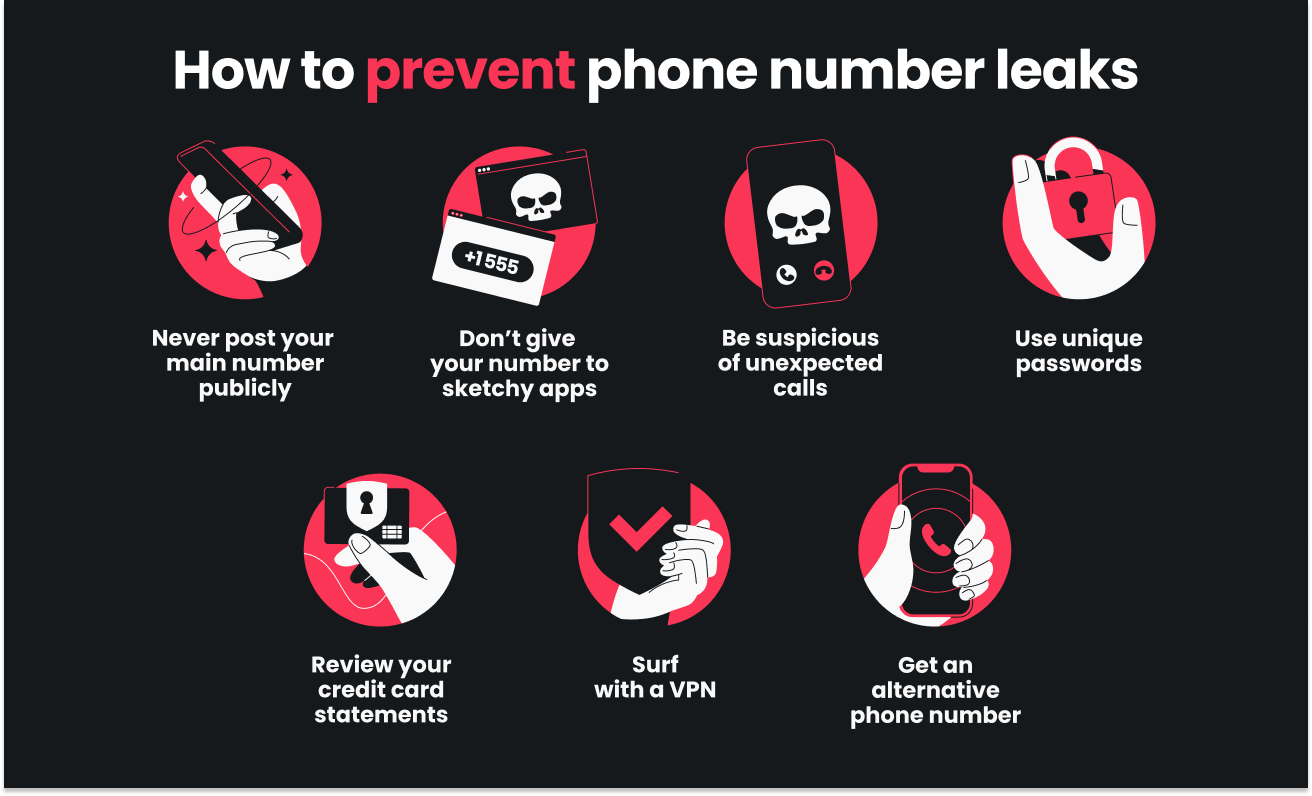
1. Never post your main number publicly
Avoid sharing your phone number on social media, forums, or other websites. Even if you trust the people you’re interacting with, you never know who can access your data later.
Moreover, you never know when a data breach can strike and expose your personal information, so you’re better off keeping your number off the web altogether.
2. Don’t give your number to sketchy websites or apps
If a free app insists on your phone number, consider whether you really need to download it.
Be cautious on unknown websites, too. Use a temporary phone number for online shopping, downloads, or when unsure about a company’s security practices.
3. Be suspicious of unexpected calls or texts
If you’re getting calls or texts asking for your personal information, be careful.
Legitimate businesses won’t ask for sensitive data through unsolicited calls, so it’s much more likely that a scammer is contacting you.
4. Use unique passwords and a password manager
Make sure you’re using a different password for all your online accounts. That way, you’ll prevent one breach from compromising multiple accounts.
Take advantage of a password manager to store all your account passwords, so you don’t have to rely on your memory alone to keep track of them all.
5. Review your credit card statements
Check your bank accounts and credit reports regularly for strange activity or unauthorized transactions. You’re entitled to free reports from each of the three main credit bureaus.
Many financial institutions also let you set up fraud alert notifications or identity theft insurance coverage to stay ahead of any wrongdoers.
6. Surf with a VPN
Connecting to the internet with a VPN (Virtual Private Network) can protect your sensitive data from being intercepted while you surf. This is especially important when using public Wi-Fi.
With a tool like Surfshark VPN by your side, all your online traffic is encrypted. This makes it much harder for prying eyes to access your sensitive information and place it on the dark web.
7. Get an alternative phone number
You aren’t limited to a single phone number for everything you do. Services like Surfshark’s Alternative ID let you use a different phone number for various purposes.
The paid alternative number add-on gives you a virtual phone number, letting you mask your main number to minimize data sharing and the risk of having your phone number end up on the dark web.
Keep your main line for friends and family members, and use an alternative number for spam, discounts, and online accounts.
Key takeaway: Defend your number from the dark web
By getting data leak alerts, increasing your privacy with a VPN, and using an alternative phone number, you minimize the risk of your phone number getting on the dark web and mitigate any damage done if it’s already there.
Thankfully, all three tools are included in the Surfshark One bundle. With just a few clicks, you can take quick, decisive actions to protect yourself from dark web risks.
Check out Surfshark One today.
FAQ
What happens if your phone number is on the dark web?
If your phone number is found on the dark web, it may be part of a data breach and could be used by cybercriminals for scam calls, phishing attempts, SIM swapping, or identity theft.
You might receive more spam calls or texts, and phone scams could trick you into giving up more personal information.
Should I be worried if my information is on the dark web?
Yes, finding your data on the dark web is cause for concern, but you shouldn’t panic. Your private details were likely exposed in a breach, but you can take immediate action to better protect yourself.
Secure your online accounts, watch for suspicious activity or unauthorized financial transactions, and use a data leak monitoring service to help safeguard your sensitive information.
Can I do a free dark web scan?
Yes, you can get a free dark web scan, but free options are usually limited to one-time checks or a small data set.
For ongoing protection and deeper monitoring, a paid tool that offers dark web monitoring is a smarter choice. It can constantly scan for your personal information across a wider range of sources and alert you in real time if something new shows up, giving you more time to act before any scammers do.

